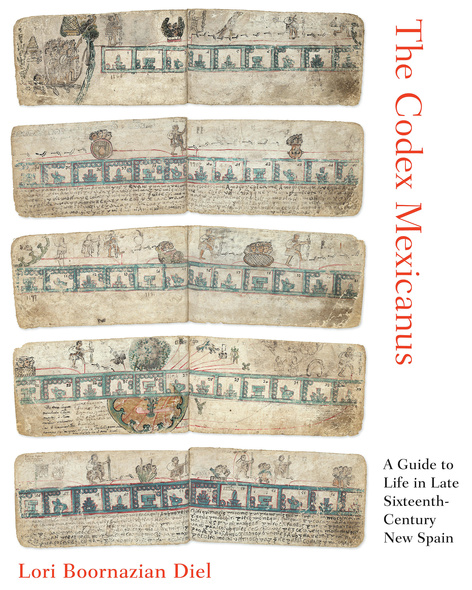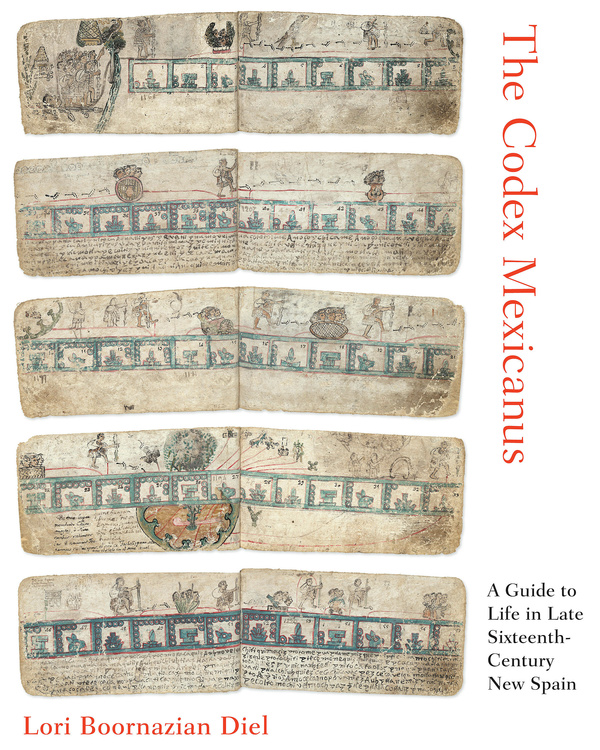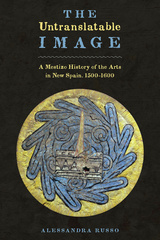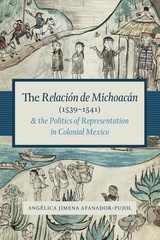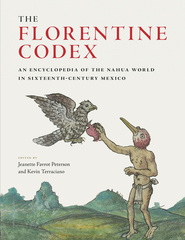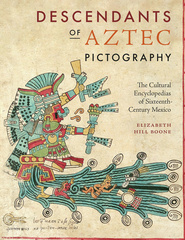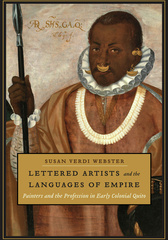Our shopping cart is currently down. To place an order, please contact our distributor, UTP Distribution, directly at utpbooks@utpress.utoronto.ca.
The Codex Mexicanus
A Guide to Life in Late Sixteenth-Century New Spain
Winner, Roland H. Bainton Book Prize, The Sixteenth Century Society and Conference, 2019
Some sixty years after the Spanish conquest of Mexico, a group of Nahua intellectuals in Mexico City set about compiling an extensive book of miscellanea, which was recorded in pictorial form with alphabetic texts in Nahuatl clarifying some imagery or adding new information altogether. This manuscript, known as the Codex Mexicanus, includes records pertaining to the Aztec and Christian calendars, European medical astrology, a genealogy of the Tenochca royal house, and an annals history of pre-conquest Tenochtitlan and early colonial Mexico City, among other topics. Though filled with intriguing information, the Mexicanus has long defied a comprehensive scholarly analysis, surely due to its disparate contents.
In this pathfinding volume, Lori Boornazian Diel presents the first thorough study of the entire Codex Mexicanus that considers its varied contents in a holistic manner. She provides an authoritative reading of the Mexicanus’s contents and explains what its creation and use reveal about native reactions to and negotiations of colonial rule in Mexico City. Diel makes sense of the codex by revealing how its miscellaneous contents find counterparts in Spanish books called Reportorios de los tiempos. Based on the medieval almanac tradition, Reportorios contain vast assortments of information related to the issue of time, as does the Mexicanus. Diel masterfully demonstrates that, just as Reportorios were used as guides to living in early modern Spain, likewise the Codex Mexicanus provided its Nahua audience a guide to living in colonial New Spain.
Well-written and beautifully illustrated.
In this superb monograph by Lori Boornazian Diel, the Codex Mexicanus has finally found its integration...[The Codex Mexicanus] feels like a definitive step forward in Mexican manuscript studies because of how it illuminates not just the codex but also the wider, unstable environment in which native people were challenged to reconcile their established world with a new one imposed by their colonizers.
Diel's book is a useful and notable contribution to Mesoamerican scholarship in general and Pre-Columbian and colonial manuscript study specifically...Diel's arguments and suggestions elicit novel ways of evaluating the Codex Mexicanus, Mesoamerican manuscript-making tradition, and Amerindians' experiences in colonial society including their struggle in the sixteenth century to reconcile the preservation of their traditions with their embrace of Christianity.
The Codex Mexicanus includes a fifty-two-page color facsimile of the original manuscript, to which Boornazian Diel refers often in her analysis, as well as to more than three dozen facsimile excerpts from other contemporaneous pictorial Nahua manuscripts. She is thus able to situate the Mexicanus solidly within the intellectual and religious context of late sixteenth-century New Spain.
Diel offers a well-crafted, thorough analysis of the Codex Mexicanus in a very readable style free of jargon that will find a university audience at all levels in fields such as history, anthropology, and cultural studies…In the end, we are left with a profound look at the genesis of the cultural hybridity that defines Mexico to this very day.
A welcome addition to the literature on sixteenth-century manuscripts from central Mexico...This book will be of use to scholars interested not only in indigenous histories and calendars but also in the intellectual culture of late sixteenth-century New Spain.
[The Codex Mexicanus] offers an up-to-date synthetic commentary with a reproduction of the codex in colour photographs. This is a much-needed, well-written and nicely presented work.
Lori Diel has finally given [The Codex Mexicanus] the attention it deserves...This work is yet more evidence that art historians are in the vanguard of colonial native history. Diel’s study of the Codex Mexicanus is invaluable not just for its masterful reading of the codex’s pictorial content but also for its contribution to our understanding of early colonial Nahuas. By placing the codex firmly in its colonial context, Diel adds fascinating detail to the ways in which Nahuas negotiated both native and European systems of knowledge—knowledge of time, of medicine, of the stars, of the past—to create a text that contained information useful in their own late sixteenth-century lives.
Diel’s book is especially valuable for treating all parts of the manuscript and trying to make sense of it as a whole...The University of Texas Press and the author are to be commended for their decision to reproduce the manuscript in its entirely...By bringing us closer to the minds of indigenous intellectuals as they pondered their era’s regime of time, Diel is to be applauded for addressing another of colonization’s cruel legacies: the denial of indigenous history.
[A] thoroughly comprehensive analysis...Despite [the Codex Mexicanus's] poor condition and esoteric, sometimes innovated words and symbols, Diel deciphers and translates every page, providing a masterful and complete exposition of this important colonial indigenous work of art and knowledge...Diel’s book is extraordinarily well researched, drawing upon a comprehensive bibliography. Despite its affordable cost, it is lavishly produced with many illustrations taken from cognate Spanish- and indigenous-authored documents of that century. Beyond Aztec specialists, who will want to own it, this volume is valuable to anyone interested in the late-sixteenth-century epicenter of New Spain, from a European or an indigenous perspective.
This book is highly welcome as a first-time documentation and in-depth analysis of the Codex Mexicanus...[an] excellent work...Besides the many ideas and answers [Diel] provides us with in her in-depth analyses she raises many questions throughout her work, so that this book may also serve as a source for future studies in the field of Central Mexican native cultural identity in colonial times.
Diel’s book provides the first comprehensive study of this extraordinarily compelling text, but her insights into the Codex Mexicanus go far beyond that specific book and allow us a window onto the ways in which native peoples and societies survived the Spanish invasion and occupation...Her exquisitely well-researched study of this extraordinary document is essential reading for scholars and students of colonial Mexico and colonialism more broadly, especially as it relates to the survival and adaptation of indigenous cultural knowledge and traditions.
[A] thorough and authoritative analysis, the first such treatment of [the Codex Mexicanus]...The value of this tome to Southwestemists lies in a better understanding of what was going on in central Mexico prior to major movements northward by missionaries, military and civil settlers.
The Codex Mexicanus fortifies Lori Boornazian Diel’s reputation as a leading art historian of colonial Mexico. An in-depth study of a postcontact pictorial manuscript from central Mexico, this book artfully combines a catalog of the contents with the author’s own significant analysis...The Codex Mexicanus joins the ranks of excellent books centered on a single text. In addition to providing beautiful color plates of the original manuscript, the author shows the context of its creation and comparisons with related codices. Overall, this book is a balanced and well-written examination of the content of the source, both visual and alphabetic, accompanied by Diel’s expert analysis.
- List of Illustrations
- Acknowledgments
- Chapter 1. The Codex Mexicanus and Its World of Production
- Chapter 2. Time and Religion in the Aztec and Christian Worlds
- Chapter 3. Astrology, Health, and Medicine in New Spain
- Chapter 4. Divine Lineage. A Genealogy of the Tenochca Royal House
- Chapter 5. A History of the Mexica People. From Aztlan to Tenochtitlan to New Spain
- Chapter 6. Conclusions and an Epilogue
- Appendix 1. Pictorial Catechism, Codex Mexicanus, pages 52–54
- Appendix 2. Zodiac Text Transcription, Codex Mexicanus, pages 24–34
- Notes
- Bibliography
- Index

